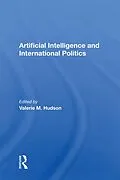For well over a decade researchers in international relations have sought ways to combine the rigor of quantitative techniques with the richness of qualitative data. Many have discovered that artificial intelligence computer models allow them to do just that. Computer programs modeling international interactions and foreign policy decision making attempt to reflect such human characteristics as learning, memory, and adaptation. In this volume of original essays, distinguished scholars present a comprehensive overview of their research and reflect on the potential of artificial intelligence as a tool for furthering our understanding of international affairs.
The contributors take a broad look at the early stirrings of interest in artificial intelligence as a potentially useful method of political analysis, exploring such topics as intentionality, time sense, and knowledge representation. The work also focuses on the current state of artificial intelligence and examines its general areas of emphasis: international interaction, decision making groups, and cognitive processes in international politics. The contributors represent a cross section of different approaches to using artificial intelligence and reflect the major research programs across the country in this new international relations subfield
Autorentext
Valerie M Hudson
Inhalt
0. Introduction 1. Artificial Intelligence and International Relations: An Overview Part One: Conceptual Issues and Practical Concerns 2. Artificial Intelligence and Intuitive Foreign Policy Decision-Makers Viewed as Limited Information Processors: Some Conceptual Issues and Practical Concerns for the Future 3. Steps Toward Artificial Intelligence: Rule-Based, Case-Based, and Explanation-Based Models of Politics 4. Text Modeling for International Politics: A Tourist's Guide to RELATUS 5. Reasoning and Intelligibility 6. The Computational Modeling of Strategic Time Part Two: AI/IR Research: International Events and Foreign Policy Decision Making 7. Pattern Recognition of International Event Sequences: A Machine Learning Approach 8. Scripting International Power Dramas: A Model of Situational Predisposition 9. UNCLESAM: The Application of a Rule-Based Model of U.S. Foreign Policy Making 10. Modeling Foreign Policy Decision Making as Knowledge-Based Reasoning 11. Decision Making and Development: A "Glass Box" Approach to Representation Part Three: AI/IR Research: The Discourse of Foreign Policy 12. The Expertise of the Senate Foreign Relations Committee 13. Reproduction of Perception and Decision in the Early Cold War 14. Theoretical Categories and Data Construction in Computational Models of Foreign Policy 15. Semantic Content Analysis: A New Methodology for the RELATUS Natural Language Environment 16. Time Space: Representing Historical Time for Efficient Event Retrieval
